2023年中考英语一轮复习 第五课时 七年级下册(Unit 9~Unit 12)课件(共39张PPT)
文档属性
| 名称 | 2023年中考英语一轮复习 第五课时 七年级下册(Unit 9~Unit 12)课件(共39张PPT) | 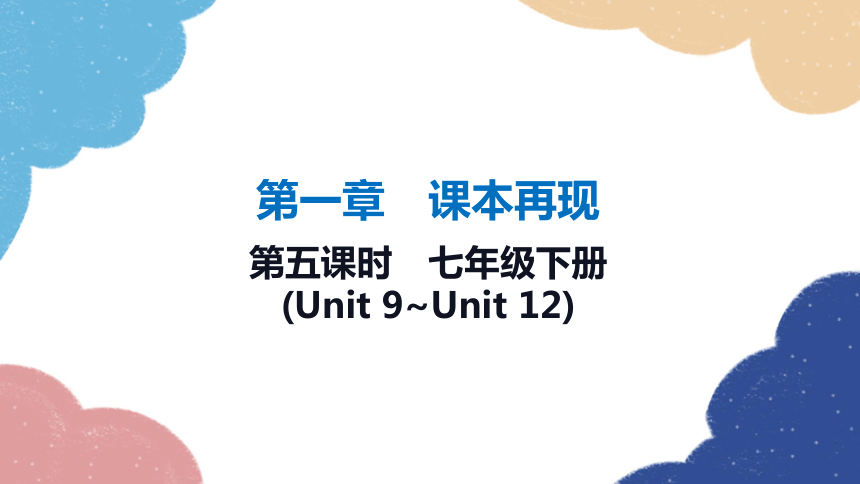 | |
| 格式 | pptx | ||
| 文件大小 | 659.5KB | ||
| 资源类型 | 教案 | ||
| 版本资源 | 人教新目标(Go for it)版 | ||
| 科目 | 英语 | ||
| 更新时间 | 2023-05-23 19:26:11 | ||
图片预览

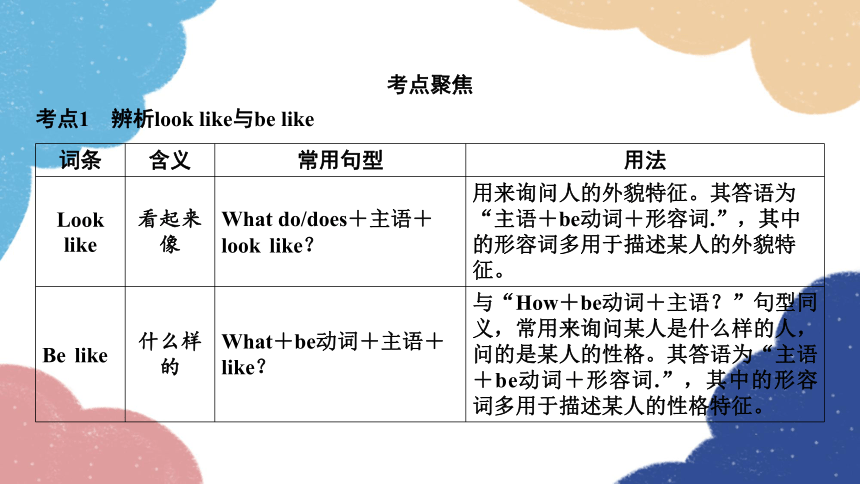
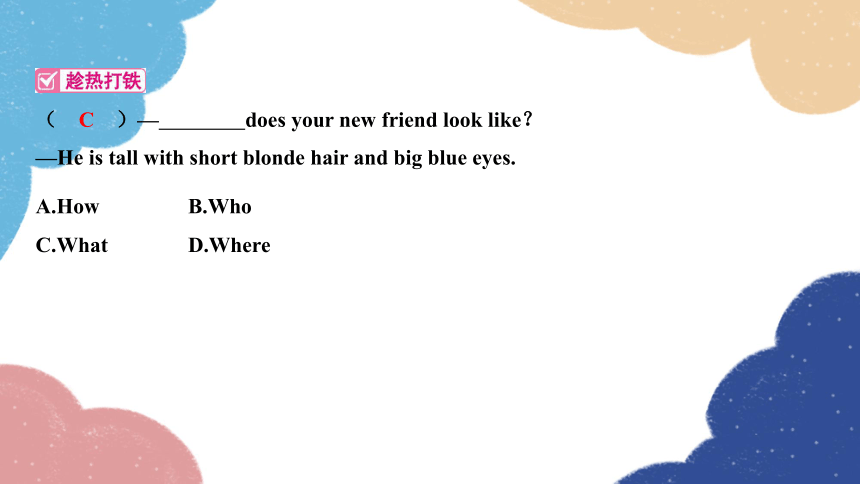
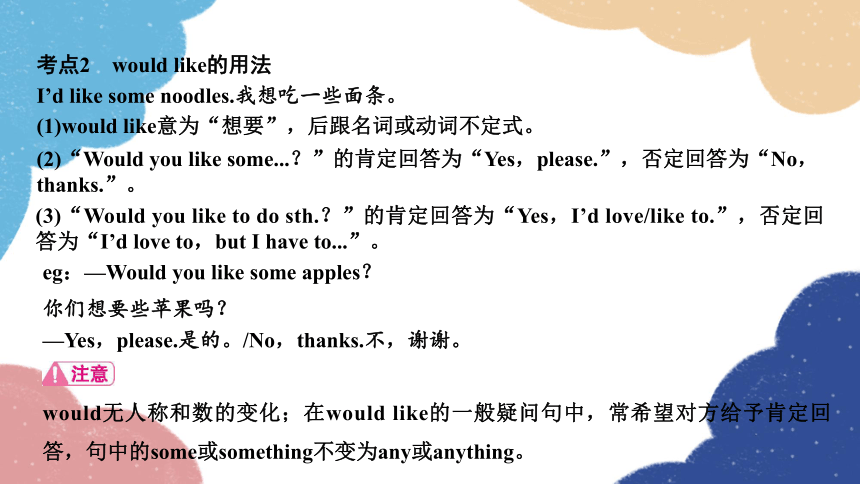
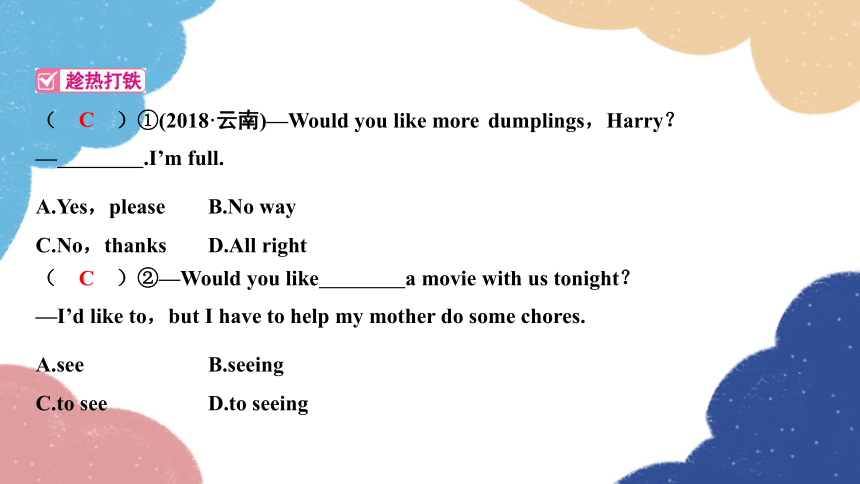
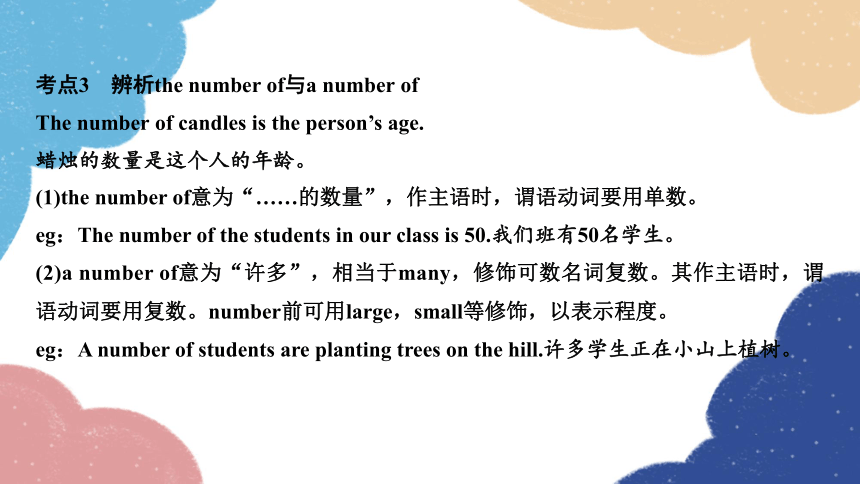
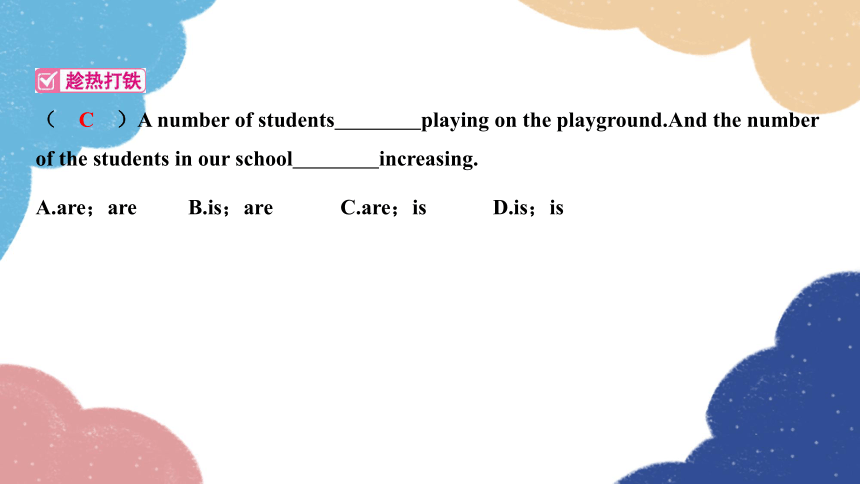
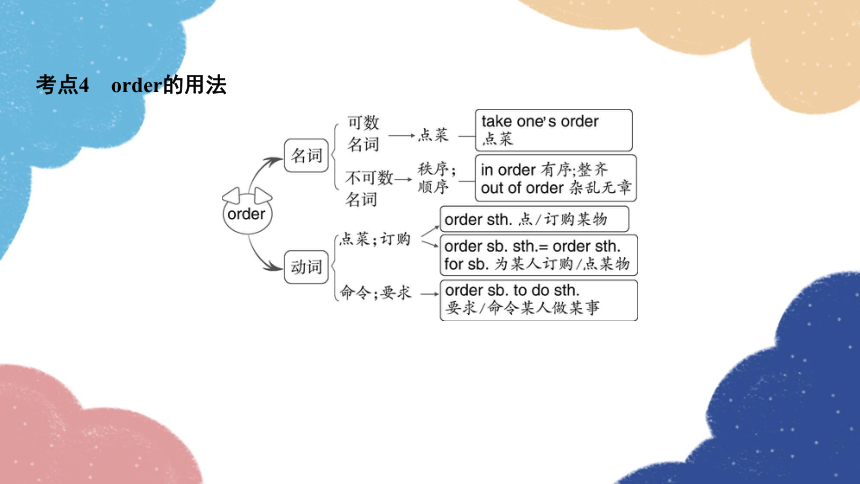
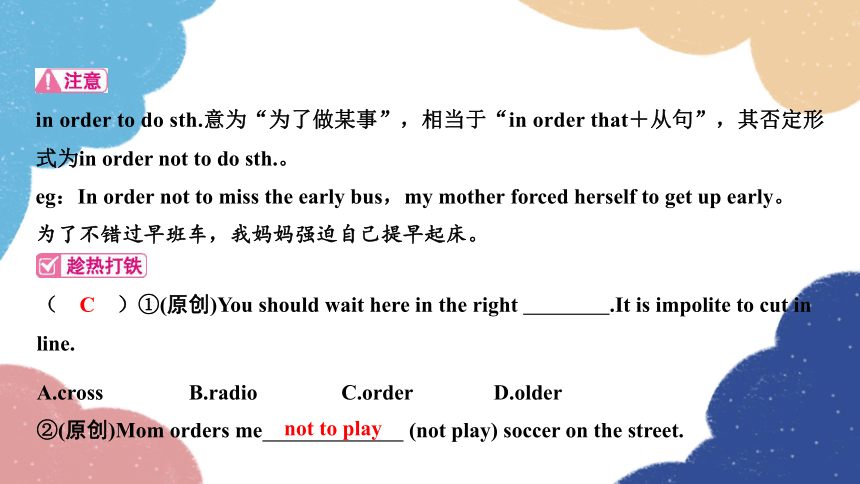
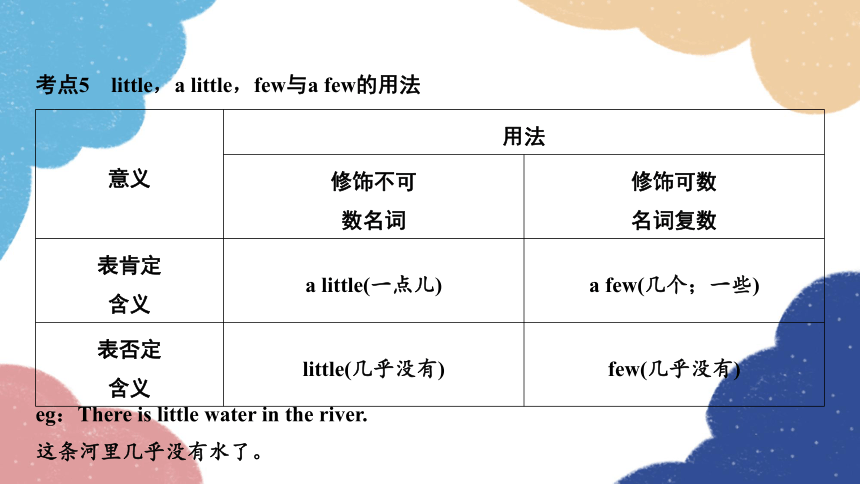
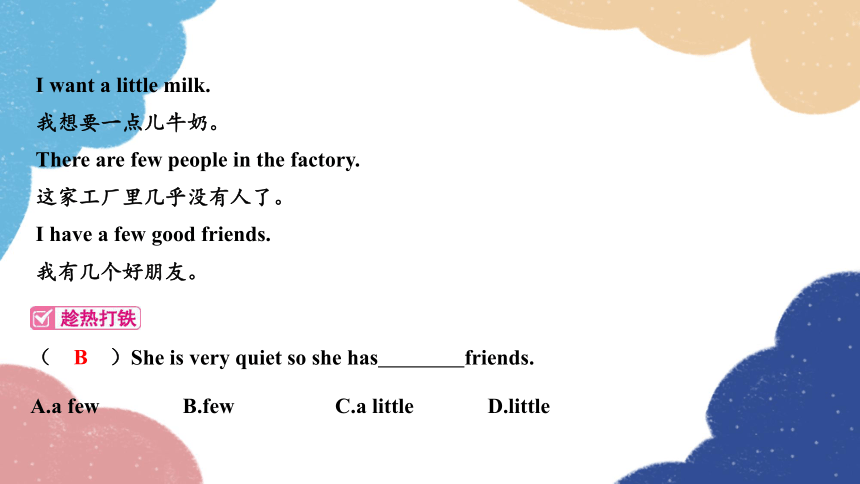
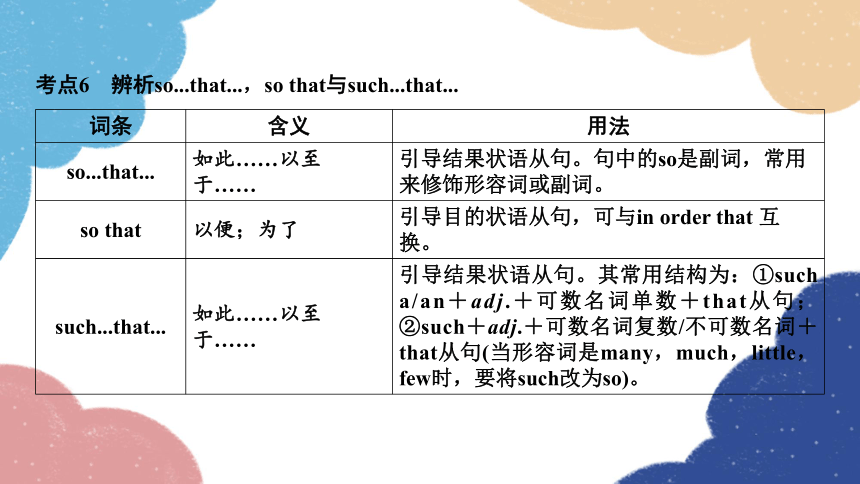
文档简介
(共39张PPT)
第五课时 七年级下册
(Unit 9~Unit 12)
第一章 课本再现
考点聚焦
考点1 辨析look like与be like
词条 含义 常用句型 用法
Look like 看起来像 What do/does+主语+look like? 用来询问人的外貌特征。其答语为“主语+be动词+形容词.”,其中的形容词多用于描述某人的外貌特征。
Be like 什么样的 What+be动词+主语+like? 与“How+be动词+主语?”句型同义,常用来询问某人是什么样的人,问的是某人的性格。其答语为“主语+be动词+形容词.”,其中的形容词多用于描述某人的性格特征。
( C )— does your new friend look like?
—He is tall with short blonde hair and big blue eyes.
A.How B.Who
C.What D.Where
C
考点2 would like的用法
I’d like some noodles.我想吃一些面条。
(1)would like意为“想要”,后跟名词或动词不定式。
(2)“Would you like some...?”的肯定回答为“Yes,please.”,否定回答为“No,thanks.”。
(3)“Would you like to do sth.?”的肯定回答为“Yes,I’d love/like to.”,否定回答为“I’d love to,but I have to...”。
eg:—Would you like some apples?
你们想要些苹果吗?
—Yes,please.是的。/No,thanks.不,谢谢。
would无人称和数的变化;在would like的一般疑问句中,常希望对方给予肯定回答,句中的some或something不变为any或anything。
( C )①(2018·云南)—Would you like more dumplings,Harry?
— .I’m full.
A.Yes,please B.No way
C.No,thanks D.All right
( C )②—Would you like a movie with us tonight?
—I’d like to,but I have to help my mother do some chores.
A.see B.seeing
C.to see D.to seeing
C
C
考点3 辨析the number of与a number of
The number of candles is the person’s age.
蜡烛的数量是这个人的年龄。
(1)the number of意为“……的数量”,作主语时,谓语动词要用单数。
eg:The number of the students in our class is 50.我们班有50名学生。
(2)a number of意为“许多”,相当于many,修饰可数名词复数。其作主语时,谓语动词要用复数。number前可用large,small等修饰,以表示程度。
eg:A number of students are planting trees on the hill.许多学生正在小山上植树。
( C )A number of students playing on the playground.And the number of the students in our school increasing.
A.are;are B.is;are C.are;is D.is;is
C
考点4 order的用法
in order to do sth.意为“为了做某事”,相当于“in order that+从句”,其否定形式为in order not to do sth.。
eg:In order not to miss the early bus,my mother forced herself to get up early。
为了不错过早班车,我妈妈强迫自己提早起床。
( C )①(原创)You should wait here in the right .It is impolite to cut in line.
A.cross B.radio C.order D.older
②(原创)Mom orders me not to play (not play) soccer on the street.
C
not to play
考点5 little,a little,few与a few的用法
意义 用法
修饰不可 数名词 修饰可数
名词复数
表肯定 含义 a little(一点儿) a few(几个;一些)
表否定 含义 little(几乎没有) few(几乎没有)
eg:There is little water in the river.
这条河里几乎没有水了。
I want a little milk.
我想要一点儿牛奶。
There are few people in the factory.
这家工厂里几乎没有人了。
I have a few good friends.
我有几个好朋友。
( B )She is very quiet so she has friends.
A.a few B.few C.a little D.little
B
考点6 辨析so...that...,so that与such...that...
词条 含义 用法
so...that... 如此……以至于…… 引导结果状语从句。句中的so是副词,常用来修饰形容词或副词。
so that 以便;为了 引导目的状语从句,可与in order that 互换。
such...that... 如此……以至于…… 引导结果状语从句。其常用结构为:①such a/an+adj.+可数名词单数+that从句;②such+adj.+可数名词复数/不可数名词+that从句(当形容词是many,much,little,few时,要将such改为so)。
( A )①(2022·龙东)The Battle at Lake Changjin is wonderful movie I want to see it again.
A.sucha;that B.so;that
C.such an;that
( C )②(2022·自贡)—This math exercise is difficult I can’t work it out.
—Come on!Use your head and you will find a way.
A.such;that B.so;which
C.so;that
A
C
重点语法
语法点一 动词不定式
初中阶段最常见的动词不定式的考点:
(1)动词不定式作目的状语。
eg:I stayed up late to watch the soccer game.
我熬夜为了观看这场足球比赛。
(2)“疑问词+动词不定式”作宾语。
eg:I want to know how to make a banana milk shake.=I want to know how I can make a banana milk shake.
我想知道怎样制作香蕉奶昔。
(3)动词不定式作后置定语。
eg:This is a good way to study English.
这是个学习英语的好方法。
(4)动词不定式作原因状语。
固定短语:be+带有感彩的形容词+to do sth.因做某事而感到……
eg:She is sad to hear the news.
听到这个消息,她很难过。
(5)动词不定式作主语和宾语。
eg:To learn English well is necessary.
学好英语是有必要的。
◆中考关于动词不定式的大部分考点在于考查固定搭配。常见带有动词不定式的固定搭配:
(1)begin/start/choose/decide/expect/fail/
help/hope/wish/learn/offer/plan/promise/agree/refuse/want/afford to do sth.
(2)ask sb.(not) to do sth.,tell sb.(not) to do sth.,order sb.(not) to do sth.,warn sb.(not) to do sth.,wish sb.(not) to do sth.
(3)部分动词后跟to do sth.或doing sth.。
( A )①(2018·成都)I got up early this morning my grandma at the airport.
A.topick up B.picking up
C.picked up
( D )②(2018·南充)—Have you ever read thetraditional story Yu Gong Moves a Mountain?
—Yes,our teacher often advises us meaningful traditional books.
A.reading B.reads
C.read D.toread
A
D
( D )③(2020·天津)I’ve just watched a TV program about space.I hope on the moon one day.
A.walk B.walked
C.walking D.to walk
D
语法点二 一般过去时
(1)一般过去时表示过去某个时间或某一段时间内发生的动作或存在的状态。
eg:I ate a large bowl of beef noodles yesterday afternoon.
昨天下午我吃了一大碗牛肉面。
(2)一般过去时由“主语+动词过去式”构成。一般过去时没有人称和数的变化,因此主语即使是第三人称单数,也和其他人称一样变化。
①一般过去时的肯定句句型:主语+动词过去式+其他.
eg:She went to see a friend of hers.
她去看了她的一个朋友。
At noon I had lunch with a friend of mine.
中午我和我的一个朋友一起吃了午饭。
②一般过去时的否定句句型:主语+did not(didn’t)+动词原形+其他.
eg:He didn’t go to school yesterday because he was ill.由于生病,他昨天没去上学。
I didn’t see Mr.Jones,but I saw John Smith.我没有看见琼斯先生,但我见到了约翰·史密斯。
③一般过去时的一般疑问句句型:Did+主语+动词原形+其他?
肯定回答:Yes,主语+did.
否定回答:No,主语+didn’t.
eg:—Did you do your homework yesterday?
昨天你做作业了吗?
—Yes,I did.
是的,我做了。
④一般过去时的特殊疑问句句型:
疑问代词+动词过去式+其他?
疑问代词/疑问副词+did+主语+动词原形+其他?
eg:Who taught you English?
谁教的你英语?
What time did he get up yesterday?
他昨天几点起床的?
(3)一般过去时的标志词:
①ago及ago词组
②yesterday及yesterday词组
③last及last词组
④just now,in the past,in 1920等
⑤at the age of...,used to...
⑥one day,long long ago,once upon a time等
(4)动词原形变为过去式。
①规则变化:
a.一般直接加-ed。
eg:work—worked工作 visit—visited拜访
b.以不发音的字母e结尾的动词,直接加-d。
eg:live—lived居住 use—used使用
c.以“辅音字母+y”结尾的动词,变y为i,加-ed。
eg:study—studied学习
worry—worried担心
d.以重读闭音节结尾的动词,且末尾只有一个辅音字母,双写这个辅音字母,再加-ed。
eg:stop—stopped停止 plan—planned计划
②中考常见的不规则变化的动词过去式详见课本Page 141 Irregular Verbs。
( B )①John and I to visit his grandparents last Sunday afternoon.
A.go B.went
C.will go D.have gone
( B )②(2020·盐城)—My mother said you went on a Silk Road trip last year.
—Yes,it a wonderful trip.
A.is B.was
C.will be D.were
B
B
( C )③(2018·乐山)—There is someone knocking at the door.
—It must be the repairman.I him to come to fix our fridge two hours ago.
A.call B.have called
C.called
C
备考演练
一、单项选择
( A )1.(2022·昆明)When I get home,it makes me feel comfortable to find everything in apple-pie order.
A.tidy B.dirty
C.crowded D.crispy
( C )2.(2022·郴州)—Hurry up,or we will miss the school bus.
—Don’t worry.We have time.
A.few B.little C.alittle
A
C
( C )3.Would you like ?
A.eat something
B.something eat
C.something to eat
D.some glasses milk
( A )4.— they to the park last week?
—No,they TV at home.
A.Did;go;watched B.Do;go;watched
C.Did;went;watch D.Do;goes;watch
C
A
( A )5.I heard a little boy English just now.
A.reading B.to read
C.is reading D.read
( B )6.(2021·贵港)—Where does Bill live?
—He me his address,but I can’t remember it now.
A.tells B.told
C.is telling D.will tell
A
B
( B )7.Tony’s father young and Tony his father.
A.looks;looks
B.looks;looks like
C.looks like;looks
D.looks like;looks like
( C )8.(2018·武威)—It’s my turn to give a report.I feel so nervous.
—Just .I bet you’re the best.
A.give it up
B.go away
C.take it easy
D.have no idea
B
C
( D )9.Though they are little children,they have worked out many difficult math problems.
A.so;so B.such;such
C.so;such D.such;so
( C )10.Some oranges in the bag.Some beef on the table.
A.is;is B.are;are
C.are;is D.is;are
D
C
二、根据所给汉语意思完成句子
1.我度过了一个忙碌却刺激的周末。
I had a busy but exciting weekend.
2.在街道的尽头,你能发现邮局。
At the end of the street,you can find the post office.
3.让我告诉你那位画家的长相吧。
Let me tell you what the artist looks like .
4.今晚你看电影吗?
Are you going to the movies tonight?
had
a
busy
but
At
the
end
of
looks
like
going
movies
5.她中等身高,但是有点瘦,并且她留着金黄色的长发。
She is of medium height,but a little bit thin,and she has long blonde hair.
6.在你生日那天你必须许愿。
You must make a wish on your birthday.
is
a
little
has
make
a
wish
感受中考
( C )1.(2020·白银)You will feel cold you don’t wear a coat.
A.so B.though C.if D.unless
( C )2.(2020·天水)Reading is a good way the world.
A.for know B.for knows
C.to know D.to knows
( B )3.(2022·黔东南州)In our school library,there a number of books onart.The number of the books still growing larger and larger.
A.is;is B.are;is
C.is;are D.are;are
C
C
B
( B )4.(2022·福建)Last month,the little girl well enough by the neighbors while her parents were volunteering.
A.is cared for
B.was cared for
C.will be cared for
( C )5.(2018·天水)Can you do the work well with time and people?
A.less;few B.few;little
C.less;fewer D.fewer;less
B
C
( B )6.(2020·甘肃)Father was so busy with his work that he had time to read the newspaper.
A.some B.little
C.much D.a bit of
7.(2019·甘肃)Would you like something to drink (drink)?
8.(2018·甘肃)My father usually goes to work early to avoid (avoid) heavy traffic.
9.There was (be) a lot of rain outside last night.
B
to drink
to avoid
was
第五课时 七年级下册
(Unit 9~Unit 12)
第一章 课本再现
考点聚焦
考点1 辨析look like与be like
词条 含义 常用句型 用法
Look like 看起来像 What do/does+主语+look like? 用来询问人的外貌特征。其答语为“主语+be动词+形容词.”,其中的形容词多用于描述某人的外貌特征。
Be like 什么样的 What+be动词+主语+like? 与“How+be动词+主语?”句型同义,常用来询问某人是什么样的人,问的是某人的性格。其答语为“主语+be动词+形容词.”,其中的形容词多用于描述某人的性格特征。
( C )— does your new friend look like?
—He is tall with short blonde hair and big blue eyes.
A.How B.Who
C.What D.Where
C
考点2 would like的用法
I’d like some noodles.我想吃一些面条。
(1)would like意为“想要”,后跟名词或动词不定式。
(2)“Would you like some...?”的肯定回答为“Yes,please.”,否定回答为“No,thanks.”。
(3)“Would you like to do sth.?”的肯定回答为“Yes,I’d love/like to.”,否定回答为“I’d love to,but I have to...”。
eg:—Would you like some apples?
你们想要些苹果吗?
—Yes,please.是的。/No,thanks.不,谢谢。
would无人称和数的变化;在would like的一般疑问句中,常希望对方给予肯定回答,句中的some或something不变为any或anything。
( C )①(2018·云南)—Would you like more dumplings,Harry?
— .I’m full.
A.Yes,please B.No way
C.No,thanks D.All right
( C )②—Would you like a movie with us tonight?
—I’d like to,but I have to help my mother do some chores.
A.see B.seeing
C.to see D.to seeing
C
C
考点3 辨析the number of与a number of
The number of candles is the person’s age.
蜡烛的数量是这个人的年龄。
(1)the number of意为“……的数量”,作主语时,谓语动词要用单数。
eg:The number of the students in our class is 50.我们班有50名学生。
(2)a number of意为“许多”,相当于many,修饰可数名词复数。其作主语时,谓语动词要用复数。number前可用large,small等修饰,以表示程度。
eg:A number of students are planting trees on the hill.许多学生正在小山上植树。
( C )A number of students playing on the playground.And the number of the students in our school increasing.
A.are;are B.is;are C.are;is D.is;is
C
考点4 order的用法
in order to do sth.意为“为了做某事”,相当于“in order that+从句”,其否定形式为in order not to do sth.。
eg:In order not to miss the early bus,my mother forced herself to get up early。
为了不错过早班车,我妈妈强迫自己提早起床。
( C )①(原创)You should wait here in the right .It is impolite to cut in line.
A.cross B.radio C.order D.older
②(原创)Mom orders me not to play (not play) soccer on the street.
C
not to play
考点5 little,a little,few与a few的用法
意义 用法
修饰不可 数名词 修饰可数
名词复数
表肯定 含义 a little(一点儿) a few(几个;一些)
表否定 含义 little(几乎没有) few(几乎没有)
eg:There is little water in the river.
这条河里几乎没有水了。
I want a little milk.
我想要一点儿牛奶。
There are few people in the factory.
这家工厂里几乎没有人了。
I have a few good friends.
我有几个好朋友。
( B )She is very quiet so she has friends.
A.a few B.few C.a little D.little
B
考点6 辨析so...that...,so that与such...that...
词条 含义 用法
so...that... 如此……以至于…… 引导结果状语从句。句中的so是副词,常用来修饰形容词或副词。
so that 以便;为了 引导目的状语从句,可与in order that 互换。
such...that... 如此……以至于…… 引导结果状语从句。其常用结构为:①such a/an+adj.+可数名词单数+that从句;②such+adj.+可数名词复数/不可数名词+that从句(当形容词是many,much,little,few时,要将such改为so)。
( A )①(2022·龙东)The Battle at Lake Changjin is wonderful movie I want to see it again.
A.sucha;that B.so;that
C.such an;that
( C )②(2022·自贡)—This math exercise is difficult I can’t work it out.
—Come on!Use your head and you will find a way.
A.such;that B.so;which
C.so;that
A
C
重点语法
语法点一 动词不定式
初中阶段最常见的动词不定式的考点:
(1)动词不定式作目的状语。
eg:I stayed up late to watch the soccer game.
我熬夜为了观看这场足球比赛。
(2)“疑问词+动词不定式”作宾语。
eg:I want to know how to make a banana milk shake.=I want to know how I can make a banana milk shake.
我想知道怎样制作香蕉奶昔。
(3)动词不定式作后置定语。
eg:This is a good way to study English.
这是个学习英语的好方法。
(4)动词不定式作原因状语。
固定短语:be+带有感彩的形容词+to do sth.因做某事而感到……
eg:She is sad to hear the news.
听到这个消息,她很难过。
(5)动词不定式作主语和宾语。
eg:To learn English well is necessary.
学好英语是有必要的。
◆中考关于动词不定式的大部分考点在于考查固定搭配。常见带有动词不定式的固定搭配:
(1)begin/start/choose/decide/expect/fail/
help/hope/wish/learn/offer/plan/promise/agree/refuse/want/afford to do sth.
(2)ask sb.(not) to do sth.,tell sb.(not) to do sth.,order sb.(not) to do sth.,warn sb.(not) to do sth.,wish sb.(not) to do sth.
(3)部分动词后跟to do sth.或doing sth.。
( A )①(2018·成都)I got up early this morning my grandma at the airport.
A.topick up B.picking up
C.picked up
( D )②(2018·南充)—Have you ever read thetraditional story Yu Gong Moves a Mountain?
—Yes,our teacher often advises us meaningful traditional books.
A.reading B.reads
C.read D.toread
A
D
( D )③(2020·天津)I’ve just watched a TV program about space.I hope on the moon one day.
A.walk B.walked
C.walking D.to walk
D
语法点二 一般过去时
(1)一般过去时表示过去某个时间或某一段时间内发生的动作或存在的状态。
eg:I ate a large bowl of beef noodles yesterday afternoon.
昨天下午我吃了一大碗牛肉面。
(2)一般过去时由“主语+动词过去式”构成。一般过去时没有人称和数的变化,因此主语即使是第三人称单数,也和其他人称一样变化。
①一般过去时的肯定句句型:主语+动词过去式+其他.
eg:She went to see a friend of hers.
她去看了她的一个朋友。
At noon I had lunch with a friend of mine.
中午我和我的一个朋友一起吃了午饭。
②一般过去时的否定句句型:主语+did not(didn’t)+动词原形+其他.
eg:He didn’t go to school yesterday because he was ill.由于生病,他昨天没去上学。
I didn’t see Mr.Jones,but I saw John Smith.我没有看见琼斯先生,但我见到了约翰·史密斯。
③一般过去时的一般疑问句句型:Did+主语+动词原形+其他?
肯定回答:Yes,主语+did.
否定回答:No,主语+didn’t.
eg:—Did you do your homework yesterday?
昨天你做作业了吗?
—Yes,I did.
是的,我做了。
④一般过去时的特殊疑问句句型:
疑问代词+动词过去式+其他?
疑问代词/疑问副词+did+主语+动词原形+其他?
eg:Who taught you English?
谁教的你英语?
What time did he get up yesterday?
他昨天几点起床的?
(3)一般过去时的标志词:
①ago及ago词组
②yesterday及yesterday词组
③last及last词组
④just now,in the past,in 1920等
⑤at the age of...,used to...
⑥one day,long long ago,once upon a time等
(4)动词原形变为过去式。
①规则变化:
a.一般直接加-ed。
eg:work—worked工作 visit—visited拜访
b.以不发音的字母e结尾的动词,直接加-d。
eg:live—lived居住 use—used使用
c.以“辅音字母+y”结尾的动词,变y为i,加-ed。
eg:study—studied学习
worry—worried担心
d.以重读闭音节结尾的动词,且末尾只有一个辅音字母,双写这个辅音字母,再加-ed。
eg:stop—stopped停止 plan—planned计划
②中考常见的不规则变化的动词过去式详见课本Page 141 Irregular Verbs。
( B )①John and I to visit his grandparents last Sunday afternoon.
A.go B.went
C.will go D.have gone
( B )②(2020·盐城)—My mother said you went on a Silk Road trip last year.
—Yes,it a wonderful trip.
A.is B.was
C.will be D.were
B
B
( C )③(2018·乐山)—There is someone knocking at the door.
—It must be the repairman.I him to come to fix our fridge two hours ago.
A.call B.have called
C.called
C
备考演练
一、单项选择
( A )1.(2022·昆明)When I get home,it makes me feel comfortable to find everything in apple-pie order.
A.tidy B.dirty
C.crowded D.crispy
( C )2.(2022·郴州)—Hurry up,or we will miss the school bus.
—Don’t worry.We have time.
A.few B.little C.alittle
A
C
( C )3.Would you like ?
A.eat something
B.something eat
C.something to eat
D.some glasses milk
( A )4.— they to the park last week?
—No,they TV at home.
A.Did;go;watched B.Do;go;watched
C.Did;went;watch D.Do;goes;watch
C
A
( A )5.I heard a little boy English just now.
A.reading B.to read
C.is reading D.read
( B )6.(2021·贵港)—Where does Bill live?
—He me his address,but I can’t remember it now.
A.tells B.told
C.is telling D.will tell
A
B
( B )7.Tony’s father young and Tony his father.
A.looks;looks
B.looks;looks like
C.looks like;looks
D.looks like;looks like
( C )8.(2018·武威)—It’s my turn to give a report.I feel so nervous.
—Just .I bet you’re the best.
A.give it up
B.go away
C.take it easy
D.have no idea
B
C
( D )9.Though they are little children,they have worked out many difficult math problems.
A.so;so B.such;such
C.so;such D.such;so
( C )10.Some oranges in the bag.Some beef on the table.
A.is;is B.are;are
C.are;is D.is;are
D
C
二、根据所给汉语意思完成句子
1.我度过了一个忙碌却刺激的周末。
I had a busy but exciting weekend.
2.在街道的尽头,你能发现邮局。
At the end of the street,you can find the post office.
3.让我告诉你那位画家的长相吧。
Let me tell you what the artist looks like .
4.今晚你看电影吗?
Are you going to the movies tonight?
had
a
busy
but
At
the
end
of
looks
like
going
movies
5.她中等身高,但是有点瘦,并且她留着金黄色的长发。
She is of medium height,but a little bit thin,and she has long blonde hair.
6.在你生日那天你必须许愿。
You must make a wish on your birthday.
is
a
little
has
make
a
wish
感受中考
( C )1.(2020·白银)You will feel cold you don’t wear a coat.
A.so B.though C.if D.unless
( C )2.(2020·天水)Reading is a good way the world.
A.for know B.for knows
C.to know D.to knows
( B )3.(2022·黔东南州)In our school library,there a number of books onart.The number of the books still growing larger and larger.
A.is;is B.are;is
C.is;are D.are;are
C
C
B
( B )4.(2022·福建)Last month,the little girl well enough by the neighbors while her parents were volunteering.
A.is cared for
B.was cared for
C.will be cared for
( C )5.(2018·天水)Can you do the work well with time and people?
A.less;few B.few;little
C.less;fewer D.fewer;less
B
C
( B )6.(2020·甘肃)Father was so busy with his work that he had time to read the newspaper.
A.some B.little
C.much D.a bit of
7.(2019·甘肃)Would you like something to drink (drink)?
8.(2018·甘肃)My father usually goes to work early to avoid (avoid) heavy traffic.
9.There was (be) a lot of rain outside last night.
B
to drink
to avoid
was
